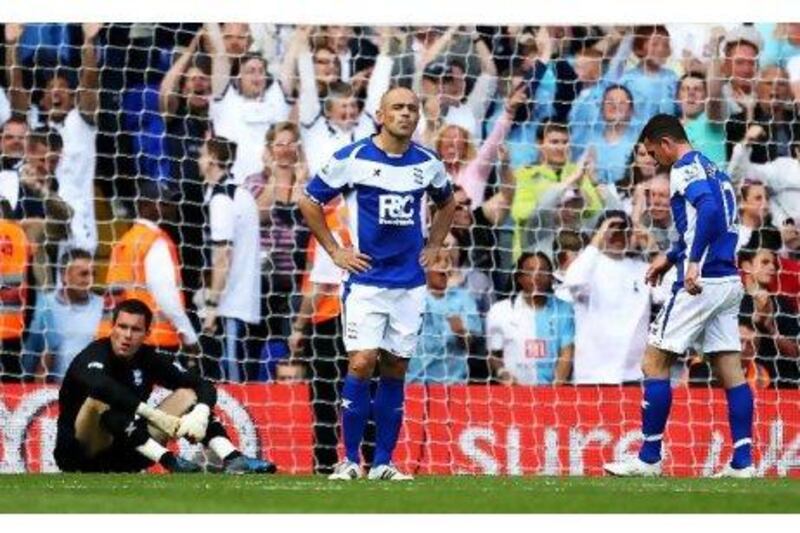A new theory is in the process of being formulated: the curse of the Carling Cup. Since its February final, Arsenal have gone from a pursuit of four trophies to a position of fourth in the table, their conquerors Birmingham City from comparative safety to the Championship.
It is understandable, then, that the Birmingham manager Alex McLeish said that the relegated club were one goal away from enjoying the greatest season in their history.
Premier League: Survival Sunday
Blackpool's bubble bursts. Read article
Alex McLeish: The worst moment of my career. Read article
Wolves survive by the skin of their teeth.Read article
Wigan avoid the drop at Stoke.Read article
Man City finish third. Read article
Chelsea and Carlo Ancelotti part ways. Read article
And yet, narrow as the margins were, Birmingham's descent began before Roman Pavlyuchenko's injury-time winner for Tottenham Hotspur on Sunday, before the late Stephen Hunt goal for Wolverhampton Wanderers that put Birmingham in the relegation zone with only three minutes to go or, for that matter, before they lifted the Carling Cup.
While the 2009/10 season was their finest league campaign in half a century, the fact remains that Birmingham ended it poorly. They won only nine of their last 48 league games. Taking three points in any game posed problems, if only because goals were so elusive.
In the anatomy of a relegation, it is all too apparent Birmingham's troubles began at the front. The league's lowest scorers had fewest shots on target, fewest efforts off target and won the lowest number of corners.
Craig Gardner's well-taken equaliser at White Hart Lane was the midfielder's eighth Premier League goal, but the damning statistic is that the specialist strikers contributed just nine goals among them.
The regular choice, Cameron Jerome, formed a blunt spearhead, going more than six months without a top-flight goal. Nikola Zigic was more beanpole than battering ram. Obafemi Martins decided the Carling Cup but, afflicted by injury, barely featured thereafter.
In one respect, the pivotal moment of their season may have occurred as early as August: Charles N'Zogbia's wage demands killed a move from Wigan Athletic. The Frenchman was inspirational in Wigan's end-of-season rally, scoring five goals in the final six games.
A Birmingham side lacking the pace and incision he offers managed a solitary point in the commensurate period. That the brittle Alexander Hleb, hastily loaned after N'Zogbia's volte face, was unsuited to the club's battling style of play hardly helped.
In one sense, the beleaguered strikers merit some sympathy. The supply line was too intermittent, especially in open play.
Birmingham confused caution with negativity, failing to record a shot on target in the first 71 minutes at Tottenham. It was symbolic that they had to send the centre-backs Roger Johnson and Curtis Davies in attack in a desperate last few minutes at White Hart Lane: they have always looked to the defence for answers.
One goalkeeper, Ben Foster, was their outstanding player this season, just as another, Joe Hart, was last year. The protection afforded by the axis of Johnson and Scott Dann was vital. Yet once the latter sustained a season-ending hamstring problem - and of all the injuries McLeish bemoaned, this was far the costliest - their reputation for resilience became ill-founded.
They conceded 26 goals in the 20 games Dann played and 32 in the 18 he missed.
Yet the factor that makes it harder to sympathise with Birmingham is that safety was within their grasp and a side renowned for their mental strength capitulated; not at White Hart Lane, but at home to a Fulham side who are notoriously poor travellers six days before, and in the 5-0 thrashing at Liverpool which, when goal difference threatened to send them down, suddenly became an issue. So, too, did their inability to beat Wolves at home.
They go down alongside Blackpool, but as opposites. Until the final few minutes, Birmingham didn't attempt to win at White Hart Lane. If Blackpool were too attacking for their own good, they were too defensive.
¿¿¿
Entertaining as their efforts were, Blackpool's demise was symptomatic of their season at the back.
Look at the Manchester United goals in Sunday's 4-2 defeat and there were individual errors (Ian Evatt for the first and third), an offside trap breached and a high defensive line exposed all too easily (for the first and fourth), midfield runners going unchecked (for the first and second) and opponents afforded far too much room on the flanks (for each of the first three).
Their football was good enough, but their defence wasn't, which is why the expected exodus from Bloomfield Road should leave the back four intact.
¿¿¿
Wigan's survival was a reward for the calmness under pressure and flawless decision-making of Roberto Martinez in recent weeks. At 2-0 down against West Ham United on May 15, he made a double substitution, introducing Conor Sammon, who scored their equaliser, and moving N'Zogbia into a central role, from where he scored twice.
At 0-0 at Stoke City on Sunday, he made a change that involved the relocation of Hugo Rodallega from the left flank to lead the attack, where he headed the winner. Wigan were virtual ever-presents in the bottom three but the manner of their escape indicates a manager with the temperament and the intelligence to prosper at the highest level.
¿¿¿
Chelsea's sacking of Carlo Ancelotti was as brutal as it was predictable. This has not been a vintage year at Stamford Bridge, but the outpouring of sympathy for the Italian is a sign of the dignity he brought to the club.






